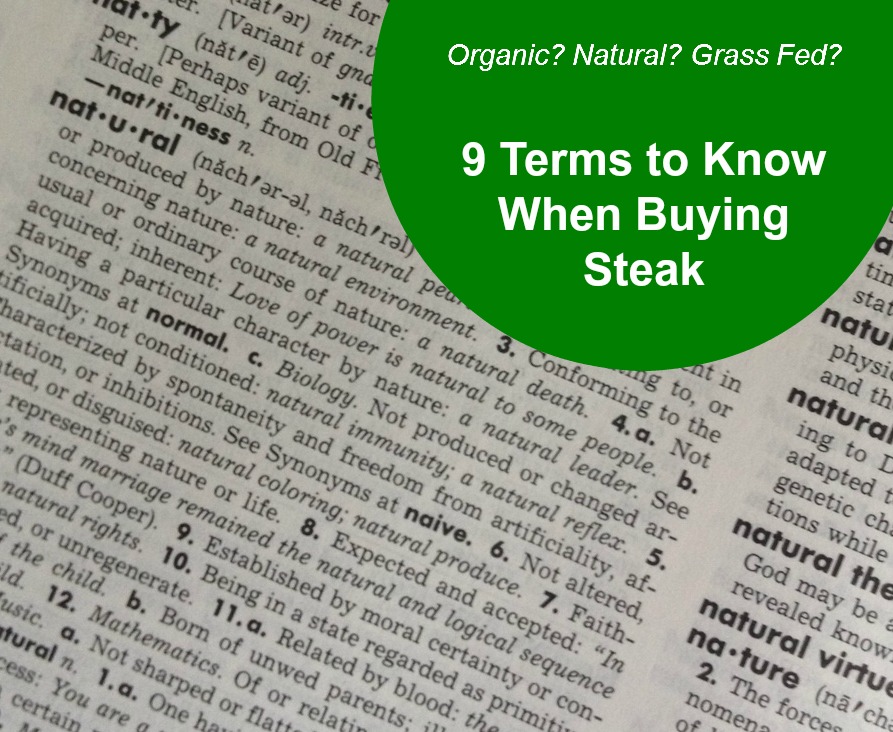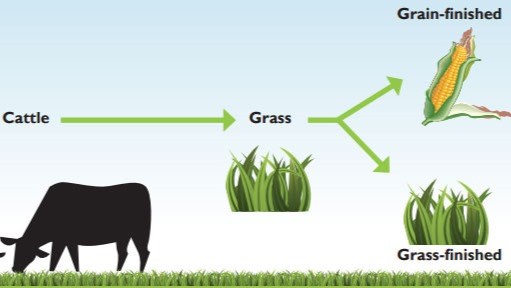Grass Fed Vs Organic Grass Fed Beef

Organic vs grass fed? Grain finished vs grass finished? Natural vs pasture raised? There is lots of confusion out there over terms like "natural," "organic" and "grass fed". This brief guide of terms will help you find your way through the mysteries of labeling, so that know what you're actually buying.
As you read through these definitions, it's important to note that
- Terms have changed over the years.
- The USDA's definition of the terms and what consumers think the terms mean sometimes differs (more on that later).
- The terms can be vague and have multiple meanings. Since farming is made up of small, family-farms throughout the U.S., we all do things slightly differently. That doesn't mean someone is doing it right and someone else is wrong, it's just different. So, if a term is vague, different farms could interpret and apply it differently.
Grass Fed
The term grass fed is not monitored by the USDA, so that term means different things to different groups. In 2016, the Agricultural Marketing Service, a branch of the USDA, announced in a statement that it was dropping its official definition of "grass fed" because it doesn't have the authority to define and determine whether grass fed claims are truthful and misleading.
Even cows in feedlots have had access to grass at some point in their life, so technically, all cows could be labeled as grass fed. Grass Fed beef has some great health attributes like more vitamin E, beta-carotene, vitamin C and omega-3 fatty acids compared to grain fed beef.
At Clover Meadows Beef, our grass fed beef live in a 100% pasture-based environment and they eat grass.
Grass Finished Beef
Since all cattle spend the majority of their lives eating grass in the pasture, what sets cattle apart is how they're "finished", or what they eat at the end of their lives.

Grass-finished cattle spend their entire lives grazing and eating from pastures. Per USDA guidelines, grass-finished cattle may also eat forage, hay or silage. Grass finished cattle may or may not be given FDA-approved antibiotics to treat, prevent or control disease and/or growth-promoting hormones.
Grain Finished
Like grass fed beef, grain finished beef spends the majority of its life grazing and eating from pastures. During the last 4-6 months of their lives, they have access to grain. How farmers give the cattle grain varies by farm.
At Clover Meadows Beef, all of our grain finished beef are raised in a 100% pasture environment, and they have the option of eating either grain or grass. Once a day, we take a bag of grain supplement to them and place it in a trough where they have the option of eating grass or the grain supplement. The grain supplement we choose is based up on cattle's nutritional needs and the recommendation of our veterinarian and nutritionist.
On some other farms, grain-finished cattle are sent to feedlots for the last 4-6 months of their lives. In the feedlot, they're given a balanced diet of grains, and local feed ingredients like potato hulls and sugar beets.
Natural
The term natural is pretty meaningless in the food industry, and the USDA doesn't monitor this term either. Any product may be labeled natural if it is minimally processed and free of artificial colors, flavors, and preservatives. Minimal processing includes smoking, roasting, freezing, drying, and fermenting.
At Clover Meadows Beef, we define natural meat as:
- Free from antibiotic residue
- Fed a balanced diet, without the addition of animal fat or animal by-products
- Raised in a pasture environment that's comfortable and stress-free
- Handled humanely at all times
- Grown using environmentally sound, sustainable farming methods
Organic
The USDA does define "organic." Organic meats are derived from naturally raised animals that are fed a diet that consists of 100% certified organic corn and soybeans grown on soil that has been free of pesticides, herbicides, and chemical fertilizers for at least three years.
On our farm, our cattle are raised to many organic standards, but we aren't certified to receive that label.
Pasture Raised
Cattle spend their lives in the pasture, and not in confined areas are considered pasture raised. All Clover MeadowsBeef are pasture raised.
Hormones
A hormone is a natural or synthetic product that affects cell activity. You'll often see products in the grocery store labeled "no added growth hormones." We do not use any added hormones at Clover Meadows Beef.
Sustainable Farming
Farming that's considered sustainable means it's good for the environment and good for the community. Sustainable farming looks long term and uses practices that won't compromise the future of the land or animals, uses natural resources responsibly, and monitors and evaluates every activity so that farming practices are constantly improving.
Inspected Meat
Did you know that meat can be inspected by State inspectors or Federal inspectors (USDA). Meat inspected by State inspectors can only be sold in the state it's produced in. Meat inspected by Federal inspectors can be sold across State lines. The inspection occurs at the processing facility. All Clover MeadowsBeef is inspected by the USDA.
Graded Meat
In addition to inspecting meat, the USDA can also grade meat. The grade is determined by the degree of marbling (internal fat) in the meat. Prime is the best and only about 2 percent of American beef is graded prime. Prime beef has the most marbling, and the USDA defines it as being "abundant marbling." Most meat that is in grocery stores in the butcher case is graded as choice, and the prepackaged meat is often times graded as select. No matter what its quality grade, all meat sold in the United States has to meet strict sanitary requirements all the way from the processor to the butcher's case.
Usually, only major packing houses have their beef graded on a regular basis, so this isn't something we do regularly at Clover Meadows Beef. However, historically, our farm has competed in quality grade competitions and we've consistently been graded very high. Clover MeadowsBeef's grass fed beef has been graded choice to prime, and our grain fed beef has been graded as high as prime.
Now it's your turn. Hopefully, we've helped explain the difference between organic vs grass fed. What terms have you seen at the grocery store that are confusing? Let us know and we'll try and shed some light on the confusion.
Source: https://www.clovermeadowsbeef.com/organic-vs-grass-fed-terms-to-know/
0 Response to "Grass Fed Vs Organic Grass Fed Beef"
Post a Comment